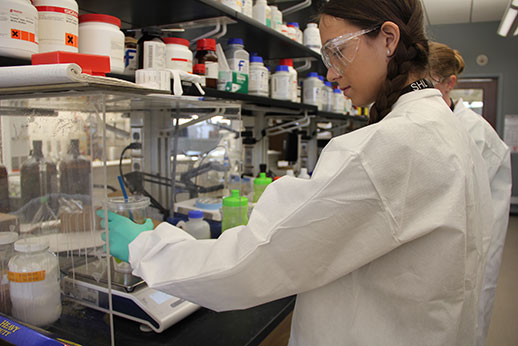
| Oct. 2014 | |||||||||||
| Top stories | |||||||||||
| In the news | |||||||||||
| Photos | |||||||||||
| Contact us | |||||||||||
| Archive | |||||||||||
|
Students ‘experiment’ with science projects |
This article was written by Joe Lundell, a University of Iowa Communications/Journalism/Marketing student and Hygienic Laboratory intern.
With technical assistance and support from State Hygienic Laboratory scientists, junior high and high school students throughout the state are completing comprehensive projects in the lab while also learning more about careers in science.
 Student Mentorship award winner Lily Fuger works on her science project in the Hygienic Lab with oversight by her mentor John Vargo, Research and Development coordinator for the Environmental Health Division.
Student Mentorship award winner Lily Fuger works on her science project in the Hygienic Lab with oversight by her mentor John Vargo, Research and Development coordinator for the Environmental Health Division.The Hygienic Laboratory’s Student Mentorship Program gives students the opportunity to take their own ideas for research and work with specialists to develop and implement that idea as a science project. Past projects include comparing bacteria in the mouths of dogs and people; testing for bacteria on doorknobs and faucets; and checking the roots of plants for pesticides.
The deadline to apply for mentorship during this school year is November 21.
The program allows students to work with laboratorians to expand their understanding of scientific methods and processes, and to improve their professional interactions beyond what they would be able to attain in a typical junior high or high school classroom.
“Throughout my partnership with the lab this year, I have been able to bring my project testing, knowledge and experience to a whole new level, that without the help of the Hygienic Lab, I may not have been able to reach in this point of my studies,” said Lily Fuger of Central Lee High School who studied environmental exposure to Bisphenol A in plastic containers. “The program has furthered my knowledge about studies and research that is happening in the lab and all around me in my country and state.”
“It’s an opportunity for students to be mentored one-on-one by scientists who are experts in the student’s specific field of interest,” says Alicia Schiller, science teacher at Central Lee High School. Schiller sponsored Lily Fuger of Central Lee High School in her study of environmental exposure to Bisphenol A in plastic containers.
Fuger and many other students selected for the program have had the opportunity to experience what a career in a scientific field is like.
“It’s rewarding to see the success of students who are interested in science, to be able to cultivate that interest,” says Fuger’s mentor, John Vargo, Ph.D., research and development coordinator for the Environmental Health Division.
The benefits of the program often extend beyond the project’s completion. Abby Walling of Iowa City West High School is a great example of the far-reaching benefits of the Mentorship Program. Walling’s comparison of bacterial types and levels on the tongues of dogs and people earned her a 2011 Young Naturalist Award from the American Museum of Natural History in New York City. Other participants have gone on to win awards in local and state science fairs.
Walling’s project also attracted national attention and was featured in the dog lover’s magazine The Bark as well as Scholastic Science World magazine. Participation in the Mentorship Program and the experiences it brings also can benefit students pursuing scholarships.
Requirements:
- Students must be in junior high or high school.
- Students must apply by November 21.
- A teacher must serve as the student's mentor and as the interface between the Hygienic Lab and the student.
- Projects must have scientific merit as determined by the teacher and the Hygienic Lab staff.
- Projects must have a focus in environmental or public health laboratory science.
- A completed application is required.
- Once the project is completed, the Hygienic Lab mentor reviews the final project documentation.
Interested students are encouraged to fill out the online application and email it to Beth Hochstedler. Students should attach a summary describing their project, its objectives, the testing desired, background information, literature or other references used for the project, and other pertinent information.